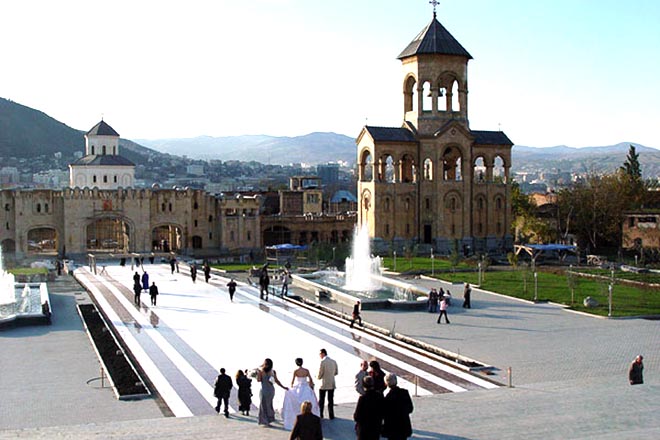Azerbaijan, Baku, Nov. 26 / Trend E.Tariverdiyeva /
Experts believe that the Georgian opposition has no chance to topple the current government in the country.
"The demonstrations in Tbilisi are a reminder of the so-called 'radical' opposition about itself, but the forces strapped to Rustaveli Avenue show that the opposition does not have the required superiority for a decisive battle and victory," Heritage Foundation's leading expert on Eurasia and Trend Expert Council member Ariel Cohen said.
A rally of the Georgian People's Assembly took place in front of the parliament building in Tbilisi yesterday. The participants demanded the resignation of the president and snap presidential and parliamentary elections.
Opposition leader Nino Burjanadze was a co-organizer of the event. The rally, which lasted 2.5 hours, brought together up to 6,000 people. The assembly adopted a verdict of non-confidence in the government and current President Mikheil Saakashvili.
Observers say although the opposition is making attempts, it has no chance to topple the current government due to its own fragmentation and weaknesses.
The opposition will fail, Johns Hopkins University Institute of Central Asia and Caucasus Director and Swedish Institute of Security Policy and Development Founder Svante Cornell said. He added that such incidents have already been observed during Saakashvili's presidency.
"This time, the opposition was not so great, and Georgia's opposition itself is nothing in itself," Cornell told trend.
Georgia is a state with a serious domestic and foreign policy.
"Since the state itself is very strong, the opposition's actions are futile," Cornell said.
The small number of people who gathered in front of parliament "did not allow us to resort to radical measures," Burjanadze told reporters.
"We were waiting for more support. It is not the type of mass that could make and execute the necessary decisions," she said.
She stressed that "the assembly will wait for greater participation and will announce new rallies later."
"If we talk about the impeachment of the president, then the country has a parliament for this, but the opposition is in the minority in parliament, especially since the 'black-and-white' opposition ignored the parliamentary elections," Cohen said.
In May 2008, the "united opposition," which included nine political forces, boycotted the elections, as the government refused to comply with its requirements.
If the opposition wants impeachment and constitutional changes, for this there are parliamentary elections, which they should try to win, Cohen said.
According to the Constitution, parliamentary elections are held every four years. The previous elections were held in May 2008. The next elections will be held in May or June 2012.
Meanwhile, President of the Georgian Foundation for Strategic and International Studies Alexander Rondeli also believes that, despite protests, the opposition will not be able to gather a large number of people on the streets.
"Everyone is bored with them and no one believes them any longer," he said in an interview with Kommersant. "They need to change themselves and their tactics."
Randeli said many reforms have been made by the government, but their implementation takes longer than the amount of time that the opposition is willing to wait.
"The opposition believes that such complex reforms can take place in five minutes and their fruits can already be reaped. This is impossible, Georgia needs time," he said.
Georgian expert Andro Barnov regards the protest as an "attempt to blow up" the situation in the country.
"The rally was directed against Georgia's state interests and against the stability in the country," Barnov told Trend.
He stressed that the protest was aimed at undermining the international authority of the country and this "cannot be in the interests of the Georgian people."
"This rally was also directed against the process of negotiations between the opposition and the authorities on the improvement of the electoral environment," Barnov said, noting that these talks are a positive development, since they must provide a change of government only through a legitimate way - through elections.
However, another Georgian expert Gia Khukhashvili believes that the protest marked the beginning of a political process that will return the people's confidence in the opposition.
"So far, no political process is observed in the country, and it should begin, so that the opposition can regain the confidence of the people," Khukhashvili told Trend.
He said the number of the people who were gathered on Nov. 25 in front of parliament, "is sufficient based on the current state of affairs."
Khukhashvili said a protest electorate will be formed in two or three months.
According to the expert, the rally's organizers did not aim to carry out radical actions on Nov. 25.
"The rally is designed for the long term and no one was betting on a one-day revelation, as such insights have implications," Khukhashvili said, stressing that Georgian society must come to terms with long-term political processes, rather than one-day radical solutions.






